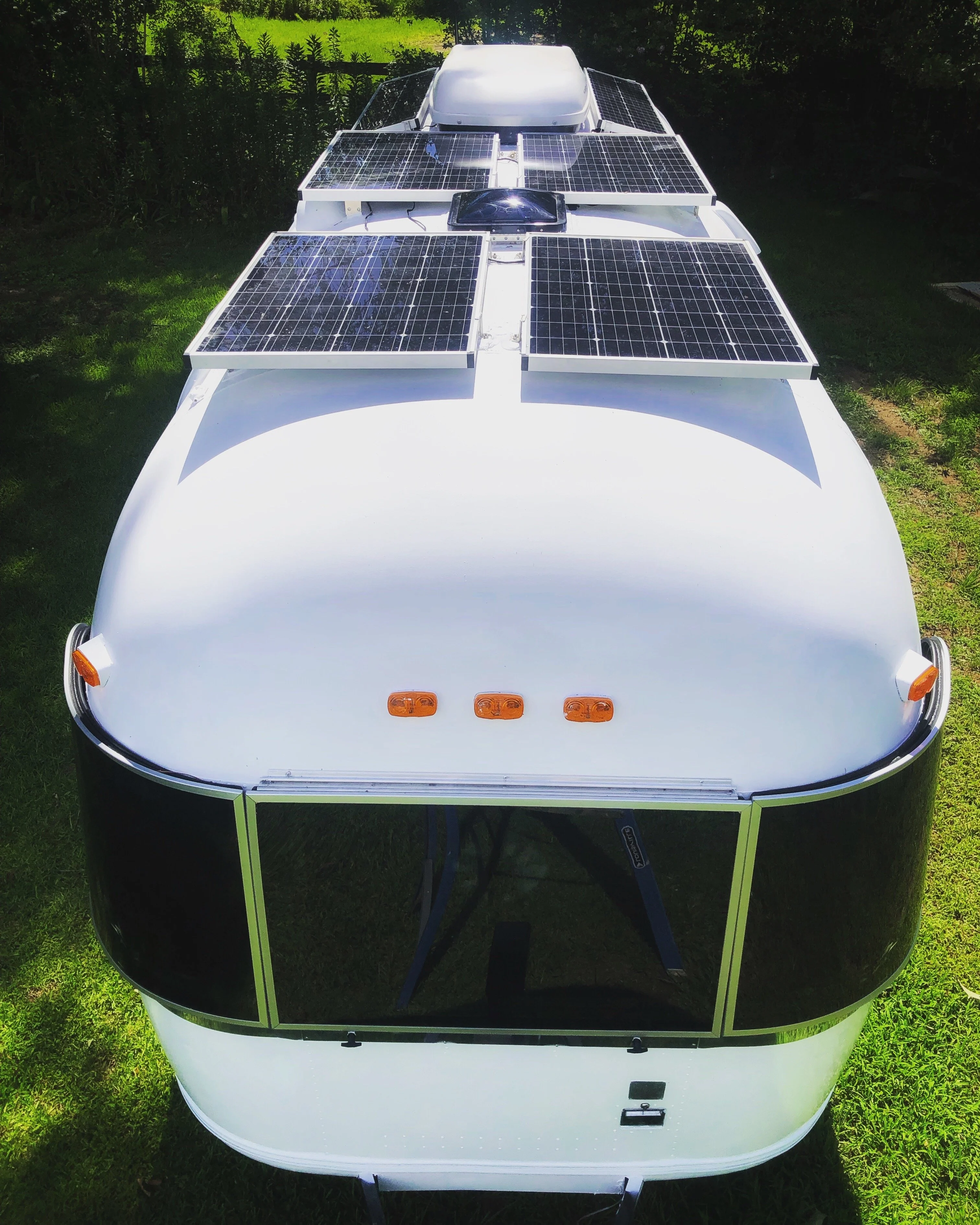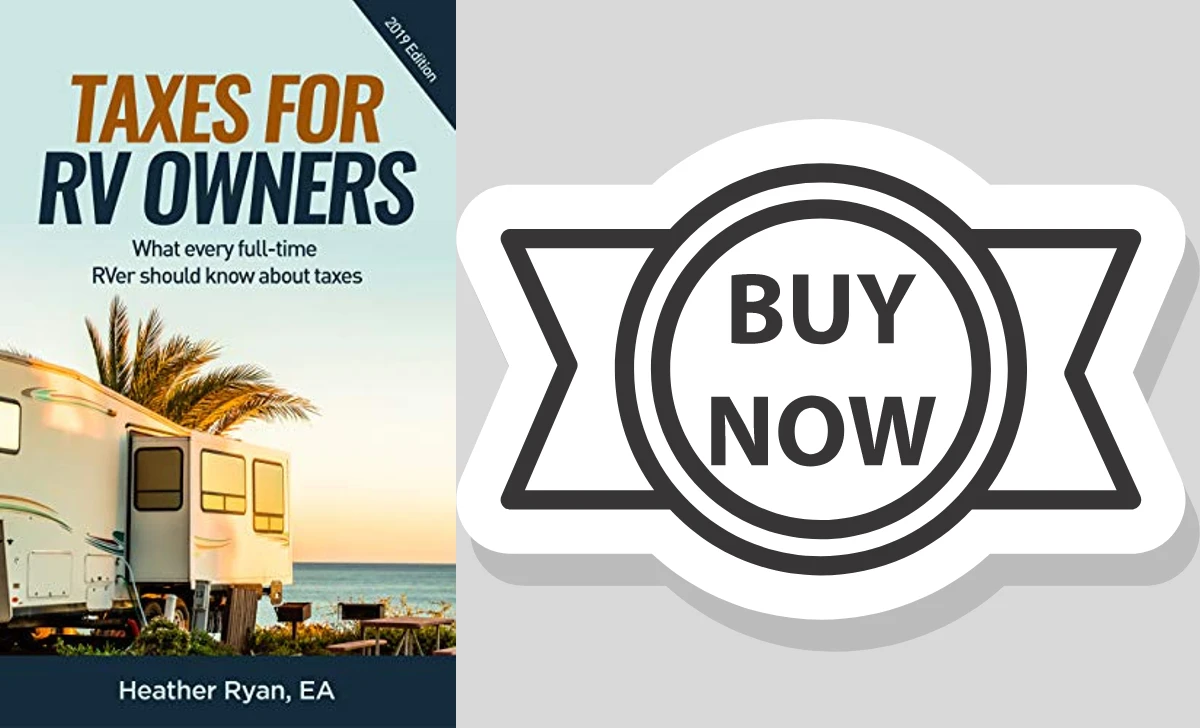“7 RV Owner Tax Tips” contributions from Heather Ryan, author or Taxes for RV Owners 2019 Edition. Ryan is a full time RVer and an enrolled agent and bookkeeper at Tax Queen LLC.
7 RV Owner Tax Tips
Whether you own an RV, or travel full time in an RV, figuring out RV related tax deductions can be a huge challenge. As RVers, we’re regularly crossing state lines, and quite often conducting business in those various states.
When we heard about Heather Ryan’s new book, Taxes for RV Owners, we knew it would be the best 8 bucks we spent all month!
Today we’re excited to be collaborating with Ryan to bring you 7 Tax Tips for RV Owners.
If these tips pique your interest, we highly encourage you to get a copy of her book. Taxes for RV Owners dives deep into all aspects of taxes as they relate to an RV purchase and RV travel.
1. Take the solar credit for that solar install
This is a nice bonus deduction for anyone who installs solar on their personal residence which includes an RV. This is part of your 1040 as a non-refundable credit which can be carried forward if you don’t have enough tax liability to take it right away.
This credit is worth 30% of your total installation costs which equates to a 30% discount on that solar install. The 30% does drop after 2019 so get in on this credit while you can!

RV Solar Panels | Tax Deduction Potential
2. Understanding domicile
Your domicile is the address you’ll use to file your taxes. If your domicile state has a state income tax, be prepared to pay it. Choosing a state with no income tax could be quite beneficial for many reasons. By now, you may already know the most popular RV domicile states; they include Florida, South Dakota and Texas.
It’s important to understand that in certain scenarios you might still owe another state an income tax return and possibly, taxes. This could be from workamping or camp hosting or physically working in a state other than your domicile.
PRO TIP: If you need help changing your domicile, Escapees RV Club will assist you in this process.
3. Take internet and phone costs
If you run a business while traveling this deduction is available to you. You’ll need to calculate the percentage of business usage for both. This simply means tracking your personal and business use for a couple of months to get the average over the year. I usually say limit this business tax deduction to 50% unless you can prove otherwise. We are, afterall, using our data plans for streaming, personal emails, researching travel, etc. Don’t leave this deduction off your taxes. It can help offer tax savings especially for us RVers that have multiple plans to stay connected while on the road.

RV Cell Phone & Internet Deduction
4. Deduct self-insured health insurance premiums
Many full-time RVers find themselves self-employed in order to make the traveling lifestyle work. If you buy traditional health insurance from the marketplace or another private insurance company, then you qualify to take this deduction. This deduction goes on your Form 1040 NOT your Schedule C. It helps bring down your income by the total of your premiums. This can be very helpful since health insurance costs are so high nowadays.
Health share ministries do NOT count as self-employed health insurance premiums. Therefore, they also don’t help you save money on your taxes.
Keep in mind this deduction is limited by your business income, so be careful there. Otherwise, why not take a deduction for the cost of your health insurance? It’s a great way to save money on your taxes for something that many consider a necessity.
5. Standard deduction vs. itemized deduction?
How do you know which one to take? First, understand the standard deduction has jumped significantly. It ranges from $12,200 for a single filer to $24,400 for married filing jointly. If your itemized deductions are greater than those numbers, then it’s no problem to use them on your tax return.
What’s included in itemized deductions?
- Medical expenses
- Charitable contributions
- State & local taxes or sales tax (personal property tax, real estate tax, sales tax)
- Mortgage interest – this includes RV loan interest if your RV is used to secure the loan
If you don’t have enough to take itemized deductions, then use the standard deduction.
6. Take the mileage deduction if you traveled specifically for business purposes
Mileage is available to those who RV. However, it’s important to keep detailed records for business specific mileage. Business mileage can include visiting a client at their office, running errands for your business like going to the post office or to Best Buy to buy a new camera, and also driving to a client meeting over a meal/coffee.
It’s super important to keep a detailed log for this including the date, number of round trip miles, the purpose of the trip – who you were meeting with or what store you visited. This will make it simple at tax time to add up your miles and get a business deduction for them.
Unfortunately, driving 15,000 miles for business would be suspicious to the IRS, so be careful what you consider business miles. This doesn’t mean you can take all your RV miles in a year.

Best Thousand Trails Campgrounds
7. Determine if you qualify for the 20% pass-through deduction
This is a new deduction which started in the 2018 tax year as part of the Tax Cut and Jobs Act. The basic idea behind it is to give a 20% deduction to those with self-employment income including sole proprietors, partnerships, and S corp owners.
It is complicated and can be limited by your income. However, if your taxable income is less than $315,000 for married filing jointly ($157,500 for single filers) and you have a net profit from a small business, then you most likely will get to take this deduction.
This is a great deduction for those who are self-employed. One that should not be left off your tax return. This is NOT a credit but a true dollar for dollar deduction of taxes owed.
Next Steps for RV Owners learning about Tax Deductions
If these RV tax tip resonate with your lifestyle, we recommend diving deeper into the subject with Heather Ryan’s book, Taxes for RV Owners.
And, for the sake of full disclosure, this isn’t a sponsored post. We’ve collaborated with Heather Ryan in the past and are very excited to learn more from her about RV Tax planning. You can also learn more about her business, Tax Queen LLC.
The Best FREE Camping in the USA
We love camping across this amazing country. And, we really love it when its free. Here’s our list of the 20 Best Free Campsites in the USA.
If you haven’t tried free camping before, also known as boondocking, take a look at our beginners guide to boondocking filled with everything you need to know to get started.
